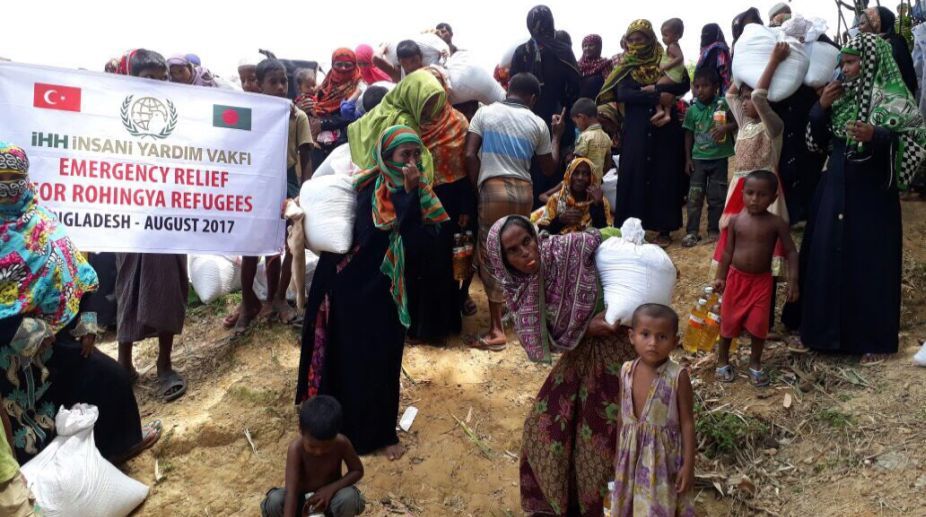On 18 May 2008, the Bangladesh High Court granted citizenship to the Biharis who were brought over to the country as minors, or were born after independence. This brought an end to their statelessness, and opened up prospects of education, employment and travel to a community that had been cooped up in camps and refused repatriation.
That realisation took 36 years, but with one act, the government of Bangladesh gave around three lakh people and their subsequent generations basic human rights.
The Rohingya refugees have been around in Bangladesh for just as long, but the question of citizenship has not seen any traction. Some of the most poignant visuals coming out of the Rohingya refugee crisis have been those of new-born babies. These infants were mostly born either in no-man’s land, or after crossing over to Bangladesh. This raises a simple question without a simple answer—to which country do these babies belong?
According to official estimates, the number of babies born to Rohingya refugee women is 475—but that’s just the deliveries that happened in government health centres. The official number is higher, and we can get a better sense of it by taking a look at the number of women who received post-partum treatment at these centres: 1,144.
The accuracy of that number depends on how many women actually sought medical help after delivery—the true figure could very well be even higher. Eye-witnesses report a staggering number of pregnant, expecting mothers.
The civil surgeon’s office puts the population at approximately 5,000. That means that 5,000 more infants will be born on Bangladeshi soil. So far, the only government official to make a public statement about this issue has been the Minister of Disaster Management and Relief, Mofazzal Hossain Chowdhury Maya, who told the media that newborns are being issued birth certificates as “Myanmar citizens”—a euphemism for “stateless”.
The legitimacy of such a piece of paper is thrown into question since Myanmar has consistently denied citizenship to this ethnic group. Nor are recent diplomatic negotiations indicative of that status changing any time soon. Aung San Suu Kyi’s office – the State Counsellor Office – declared in a statement last week that only “verified” Rohingyas will be taken back into Myanmar.
Suu Kyi’s definition of “verification” draws on terms set during the Rohingya repatriation initiatives undertaken in 1992; terms which state that Myanmar will be taking back only those refugees who are “carrying Myanmar Citizenship Identity Cards/ National Registration Cards” or other types of identifying documents issued by the country’s government. This paper provision is put into context by the fact that many Rohingya refugees have no identification documents at all.
Journalists and aid workers reported cases of refugees who lost their papers during the exodus or whose papers were burnt up in the flames along with their homes – that is, if they had documents to begin with. Throughout history, the community has had identification papers issued to them, only to have them revoked upon grounds of ineligibility for citizenship. This includes the National Registration Cards that Suu Kyi’s office has proposed to use for verification during the repatriation process.
Many could not renew their NRC, and were provided instead with Temporary Registration Certificates – several lakhs of which were revoked in 2015. Citizenship for the new-borns provides them with access to basic rights such as being able to go to a proper school.
Before the recent influx, the refugee population of 80,000 was being serviced by primary schools through UNICEF, but this was only limited to those living in registered camps. The last month has seen the establishment of safe zones, child spaces and classrooms, so that the lakhs of Rohingya children can at least receive something akin to an education. Such work done by aid organisations for early childhood interventions is left without impact as the children grow up without any education beyond the primary.
Even those who have grown up in the country cannot get employed, since they are not eligible for work permits. These interventions are also threatened by policies such as the 2015 decision by the Bangladeshi government to move the refugees to the inhospitable Thengar Char island.
Bangladesh is also not a party to the Convention on the Reduction of Statelessness which grants nationality to stateless births. Pakistan on the other hand affords citizenship as a birthright. In a parallel set of events, undocumented Bangladeshi children halfway across the world are in a similar fix. Just last Thursday the Trump administration started to phase out the “Dreamers” programme, an Obama-era legacy that gave some legal status to children brought over to USA by undocumented parents.
The programme is no longer accepting new applications or requests for renewals, and this will invariably affect the Bangladeshi American population, a large number of whom are undocumented migrants. It is difficult to point a finger at exactly how many children will be affected as census figures vary, but all reports conclude that the Bangladeshi-American community is one of the fastest-growing.
This will not affect the legal status of one group – children born to undocumented Bangladeshi parents in the United States. They were granted citizenship as a birthright, thereby giving them a very different life from their parents. It is time for Bangladesh to formulate a policy that will address this issue of citizenship of children born in the Rohingya camps.
(The Daily Star/ANN)











